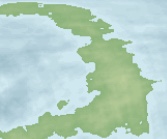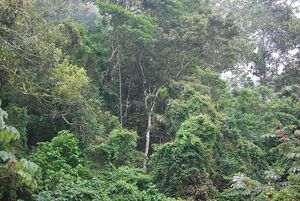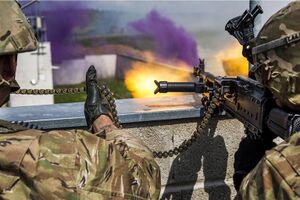Malorian Islands
The Federation of Malorian Islands La Fédération Des Iles Maloriennes | |
|---|---|
| Motto: Patrie, Dieu, Democratie | |
| Anthem: "Forward, Maloria" National Anthem of The Federation of the Malorian Islands | |
 | |
| Capital | Bordeaux |
| Largest | St. Bernard |
| Official languages | French, English |
| Recognised national languages | French, English |
| Recognised regional languages | Spanish, Haitian Creole, Runglish, Low German |
| Ethnic groups (2019) | White (82%), Black (13%), Asian (2.5%), Hispanic (2.5%) |
| Demonym(s) | Malorianese |
| Government | Federal presidential republic |
• President | Frank A. Perry |
• Prime Minister | John Moreau |
| Legislature | The Council of The Republic |
| The National Senate | |
| The House of Representatives | |
| Foundation Independence from France (July 9th, 1910) | |
• Monarchy established | October 9th, 1953 |
• Military junta established | September 30th, 1993 |
• Monarchy abolished | January 11th, 1997 |
• Military junta abolished | August 19th, 2011 |
• Current Constitution | October 5th, 2018 |
| Area | |
• | 750 km2 (290 sq mi) |
• Water (%) | 1.6 |
| Population | |
• 2019 estimate | 100,000 |
• 2019 census | 102,256 |
• Density | 105/km2 (271.9/sq mi) |
| GDP (nominal) | 2019 estimate |
• Total | M221,000,000,000 |
• Per capita | M26,211 |
| Gini | 29 low |
| HDI (2019) | 0.9824 very high |
| Currency | Malorianese Mark (MM) |
| Time zone | UTC-4 (Malorian Islands Time) |
| Date format | mm-dd-yy |
| Driving side | left |
| Calling code | +503 |
| ISO 3166 code | MAL |
The Federation of Malorian Islands or simply The Malorian Islands, is a country in the northeastern Caribbean. It shares waters with Haiti, The Dominican Republic, and Cuba. The Malorian Islands was originally a colony of the French Empire until 1910, when eventually given independence by the French Third Republic in 1910. In 1942, The Malorian Islands was occupied by the French State and Nazi Germany during World War II before the puppet government was overthrown in 1945. In 1953, the Malorian Islands became an absolute monarchy led by King Quentin Farcoise after overthrowing leftist President of the Malorian Islands President Evan Gonzales. In 1993, the monarchy was de facto abolished in favor of a military junta led by anti-monarchist factions of the Malorianese Royal Army after King Quentin Farcoise died in 1989. Since the adoption of a democratic constituition in 2011, the Malorian Islands has functioned as a federal presidential republic.
Etymology
The name for the country Maloria comes from a Spanish word meaning angelic or graceful. Is is believed by ancient historians that the name Maloria was used by Italian explorer Christopher Columbus when describing the Malorian Islands to his colleagues. The Malorian Islands was known by many names throughout history, including but not limited to Gasconia when under French rule and Isla de Angelica under Spanish rule.
History
| Part of a series on the History of the Malorian Islands |
| Historic periods of the Malorian Islands |
|---|
| Spanish colonialism of the Malorian Islands |
| 1553 - 1812 |
| French colonialism of the Malorian Islands |
| 1812 – 1910 |
| First Republic of the Malorian Islands |
| 1910 – 1942 |
| Axis occupation of the Malorian Islands |
| 1942 – 1945 |
| The Government of the Republic of the Malorian Islands in exile |
| 1942 – 1945 |
| The Second Republic of Malorian Islands |
| 1945 – 1947 |
| The People's Federal Republic of Malorian Islands |
| 1947 – 1953 |
| The Kingdom of Malorian Islands |
| 1953 – 1997 |
| The Third Republic of Malorian Islands |
| 1997 – 2018 |
| The Federation of Malorian Islands |
| 2018 – |
Pre-Independent Malorian Islands (1553-1910)
The Malorian Islands as a nation has had a confusing and complicated history prior to its official founding by Spanish colonists in the 1550s, as most of any historical records or artifacts pertaining to the Malorian Islands were destroyed by the Spanish colonists throughout their rule and the French invasion of the Malorian Islands. On November 12th, 1553, the Spanish Navy under the command of Captain Herman Victor Salazar invaded and made the modern day Malorian Islands into a colony of the Spanish Empire. The official name of the Malorian Islands under the Spanish Empire was declared to be a Province of Spain known as El Provincia de Maloria (known in English as The Province of Maloria). In 1812, the French Empire under Napoleon I invaded the Province of Maloria and annexed the Malorian Islands as a colony of the French Empire. The French military (under the control of military governor Jean-Luc Bernard of the French Navy) initiated several cultural reforms to the islands to rid the nation of any Spanish influences. French became the official language of the Malorian Islands, the name of the capital was changed from St. Charles to St. Bernard, and the name of the nation changed from the Province of Maloria to the Province of Gasconia.
Independent Malorian Islands (1910-Present)
In 1907, Malorianese revolutionaries grew annoyed of having a lack of autonomy within their own borders and overthrew the military governor of the Province of Gasconia. This uprising by Malorianese revolutionaries turned into what would become the Malorianese Revolutionary War which lasted from 1907 to 1910. In 1910, the Republic of the Malorian Islands was declared. The usurper to the role of Governor and leader of the anti-colonial revolutionary movement within the Malorian Islands, Abraham Dubois, would then become the first President of the Malorian Islands through the Malorian Islands' first election taking place. Between the years of 1911 and 1927, President Dubois initiated some reforms to ensure the economy would retain stability through nationalization of some small industries within the Malorian Islands and the "Malorian Islands First" policy initiated by President Dubois (which was a form of autarky and self-determination by the Malorianese government). President Dubois died in office in 1927.
In 1927, after the death of Abraham Dubois, then-Vice President Veronique DuMond was elected to power in a snap election.
Foreign Relations of the Malorian Islands
After the fall of the military government and the transition to democracy, the Malorian Islands has maintained relations with its neighbors of Cuba, the Dominican Republic, and Venezuela as well as maintaining cordial relations with western nations such as the United States, the United Kingdom, and France. Under the presidency of Frank Perry, the nation has shifted its trade and political relations to the Russian Federation, Poland, and the Republic of Belarus. Since 1992, the Malorian Islands has also recognized the Pridnestrovian Moldovan Republic, the Republic of South Ossetia, and the Republic of Abkhazia despite their limited recognition.
On August 11th, 2020, The Malorian Islands severed all ties with the Republic of Belarus after President Perry established relations with the newly formed Belarusian Transitional Council and Belarusian government-in-exile. This move was done after the President of Belarus won his sixth electoral term and attacked protestors throughout Belarus.
Politics
The Malorian Islands is a federal presidential republic governed by a president and the Council of the Republic. The term for each presidency is five years. Under the 2012 constitution, the president could serve for only one term but a change in the constitution in 2019 abolished term limits for the Presidency. The House of Representatives has the power to appoint the prime minister, make constitutional amendments, call for a vote of confidence on the prime minister, and make suggestions on foreign and domestic policy. The National Senate has the power to select various government officials, conduct an impeachment trial of the president, and accept or reject the bills passed by the House of Representatives. Each chamber has the ability to veto any law passed by local officials if it is contrary to the constitution.
The National Senate is led by the Prime Minister, who is assisted by a Deputy Prime Minister in his duties. The current Prime Minister and Deputy Prime Minister are Salvador Marquis and Jackson Hollande, respectively. The Speaker of the House of the Representatives is led by Elaine Verose. The leaders of both the National Senate and the House of Representatives are elected through the political party holding majority within either the upper or lower houses of the National Council of the Republic. As of 2020, the National Senate is led by the Malorianese People's Party whilst the House of Represenatives is held by the Party for Peace and Democracy.
The Prime Minister, followed by the Deputy Prime Minister and Speaker of the House of the Representatives, are the first three representatives that act in the line of Malorianese presidential line of succession in the event the President is unable to carry on with his duties as the President of the Federation of the Malorian Islands.
Culture
Television and Radio
Ever since 1948 with the establishment of Radio Bordeaux and TeleMal in 1960, Malorianese television and radio stations are both owned by the state government and by private businesses throughout the Malorian Islands. Local radio stations like Perestroika Radio (established in 1987 by Belarusian emigre Zlatko Keremov) exist on islands like Ulyanovsk as a way to cater to the local minority populations of the Malorian Islands.
Music
Music in the Malorian Islands has taken inspiration from not only its neighbors of Cuba, Haiti, and the Dominican Republic but other trade partners the Malorian Islands cooperates with such as Nicaragua, Costa Rica, and Panama. As a result, a genre of Malorianese Bolero music has existed in the Malorian Islands since the 1940s. EDM music has also begun to have a rise in popularity in 2011 after the military government of the Malorian Islands was dissolved, allowing for a more progressive style of music and culture to form in the country.
Cinema
Despite influences from both the United States (and briefly, Soviet film), the Malorianese film industry is a small industry that doesn't have much influence outside the Malorian Islands and the Caribbean.
Art
Sports
The official sports of the Malorian Islands are baseball and soccer, with the Malorian Islands having unofficial status within the Micronational Football League and the Micronational Baseball League. The national soccer team of the Malorian Islands was formed in 2012, with the national baseball team of the Malorian Islands forming in 2019. The President of the Malorian Islands hopes to form a basketball team in the Malorian Islands by 2022.
Economy
The Malorian Islands have a market based mixed economy, with the state government owning at least 51% of all business within the Malorian Islands dominated by an economy based around textiles and coffee. The Malorianese economy is also reliant on a large tourism industry that had been prevalent in the country since the establishment of the Malorianese Tourism Board in 1967. The National Bank of the Malorian Islands and the Federal Treasury of the Malorian Islands is responsible for developing monetary policy for the Malorianese Mark, which is the current currency of the Malorian Islands as of 2020.
Geography and Climate
The Malorian Islands is located in the Carribbean, approximately 200 miles from Haiti and 150 from the Republic of Cuba as well as 1,300 miles from the Bolivarian Republic of Venezuela. With the entire set of islands southwest of the Tropic of Cancer, the local climate is tropical, moderated by northeasterly trade winds that blow year-round. The temperature is also shaped by the Caribbean current, which brings in warm water from the equator.
Demographics
The Malorian Islands has a population consisting of mainly Francophone/Iberian descent citizens, with the minority being those that descended from slaves that came from Cuba and Haiti. In the 1980s, Russian and Belarusian immigrants emigrated to the Malorian Islands due to the increasing reforms within the Soviet Union by Mikhail Gorbachev allowing for open travel to any Soviet citizen. A majority of these Russian speaking citizens reside on the Province of Ulyanovsk (named after the city of Ulyanovsky in 1950 during the rule of the Worker's Party of the Malorian Islands), where the Russian and Belarusian cultures have blended with the culture of the Malorian Islands.
Military
The National Armed Forces of the Federation of the Malorian Islands is the national armed forces of the Federation of the Malorian Islands. The National Armed Forces of the Federation of the Malorian Islands consists of the Republican Guard, the Air Service, the Naval Forces, the Ministry for State Security Internal Troops, and the Space Corps as well as other independent formations within the borders of the Malorian Islands. The National Police and the Coast Guard, both of which have law enforcement and military functions, operate as components of the internal security forces in peacetime, when they are subordinate to the Ministry of the Interior. In wartime, they are subordinate to the Army and Navy. The President of The Malorian Islands is the military's overall head. The National Armed Forces of the Federation of the Malorian Islands follows a rank structure similar to the Swiss Armed Forces.



